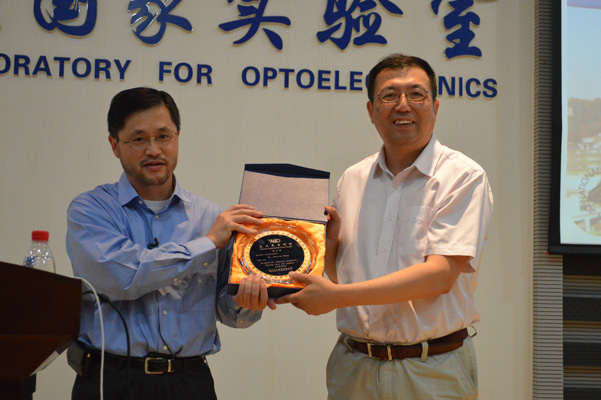WUHAN, China (June 13, 2014) - Wuhan Optoelectronics Forum No. 81 was successfully held in Auditorium A101 at Wuhan National Laboratory for Optoelectronics (WNLO) in the afternoon of June 13.
Medical imaging, since the first use of x-ray imaging in medicine, has played an ever more important role in detecting and diagnosing diseases and in evaluating treatment response. All major medical imaging modalities routinely used in the hospital today are invented within the timeframe of the last 50 years. Tremendous improvements have been made in image resolution, acquisition speed, development and exploration of novel endogenous and exogenous contrast mechanisms and imaging agents, as well as image processing, analysis, and visualization capabilities. We have progressed from simple 2D projection imaging to near real-time acquisition of 3D images; and from simple displays of anatomic structures to highly sensitive and specific reporting of physiological functions, disease states and treatment efficacy. Today, the application range of medical imaging span all major organs and disease types, from neurological diseases, metabolic disorders; to cardiovascular diseases, infectious diseases, and cancer. Similarly but from a broader perspective, biomedical imaging sciences in general has experienced great developments and expansions, and made major contributions to biological and biomedical research in advancing our understanding of the basic biology as well as the disease processes from the molecular and cellular levels to the organ and systems levels. In light of the remarkable progresses and achievements made in imaging sciences in the last 50 years, we would undoubtedly ask ourselves this question: what does future holds for biomedical imaging? In this lecture, the speaker hopes to engage the audience in a direct dialog and will attempt to offer his views on this topic from his unique vintage point.
Dr. Yantian Zhang is a program director at the Cancer Imaging Program, National Cancer Institute (NCI) of the National Institutes of Health (NIH). Prior to joining the NCI, Dr. Zhang had been with the National Institute of Biomedical Imaging and Bioengineering (NIBIB), also of the NIH, since 2004. At the NIBIB, Dr. Zhang directed the Optical Imaging as well as the Molecular Imaging programs. Dr. Zhang’s current work is primarily focused on scientific research and program management in various research areas of biomedical imaging technology development and clinical translations. Dr. Zhang has a research background in biomedical imaging and conducted MRI technology development and applications research earlier in his career. He earned the Ph.D. degree in Bioengineering from the University of Michigan in 1994.

